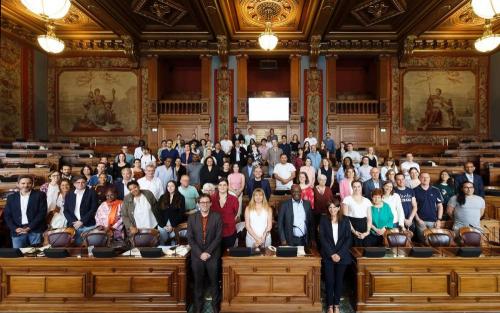
https://substack.com/home/post/p-146386519
11 JULY 2024
Last week, with official support from city and county governments in Central Oregon, more than 12,750 letters were sent to residents inviting them to be in the lottery for a Civic Assembly on Youth Homelessness.
Youth homelessness in Deschutes County has risen dramatically since 2020. The issue for this assembly was chosen in discussions with local leaders from across the community.
Thanks to the tireless efforts of DemocracyNext Oregon Program Lead Josh Burgess, as well as a broad array of partners including Healthy Democracy, the lead operators of the lottery and assembly process, this marks the first step to organising an assembly that will take place in the fall. The assembly will meet for 4.5 days of deliberation, on 14-15 Sept, and 4-6 October; assembly members will receive a stipend of the equivalent of $15 per hour; childcare and transportation costs will be covered if needed.
After a lottery process to generate a randomised miniature-representation of Deschutes County from those who respond to the letters, thirty people will be given the time and resources to study the issue of youth homelessness, deliberate, and to present policy recommendations to local decision-makers.
“We’ve all seen the impacts of homelessness on Central Oregon and around the country. Our local governments and service organizations continue to work extraordinarily hard to find solutions,” said Burgess. “Too often, other regions delegate the task of helping homeless youth to a small group of leaders and fail to draw on the rich expertise and diversity of the whole community. The Deschutes County Civic Assembly gives us the chance to involve residents from all walks of life in prioritizing policies and resources, bringing us together around solutions that will be more legitimate and sustainable.”
“We’ve already seen a long history of success using the Civic Assembly model in the US – including a wave of Citizens’ Juries in the 1970s, Oregon’s very own Citizens’ Initiative Review, and recent local Assemblies in Oregon and California,” said Linn Davis, Program Co-Director at Healthy Democracy. “When we bring new voices into public decision making and empower people with the right process, these processes produce political breakthroughs that we rarely see in traditional public engagement.”
Deschutes County Commissioner Tony DeBone added, “I support this Civic Assembly project that provides the opportunity for my fellow community members to learn about a topic and then provide guidance from the group's super intelligence that comes from working together.”
The County Commission voted unanimously on June 24 to endorse the Civic Assembly as an innovative way to involve community members in preventing and ending youth homelessness. The process is supported by the Bend City Council as well.
This assembly is an initial pilot of the Central Oregon Civic Action Project (COCAP), a first-of-its-kind collaboration between Deschutes County, the City of Bend, the Regional Housing Council, Oregon State University – Cascades, and the nonprofits Healthy Democracy and DemocracyNext, supported by Ford Family Foundation, Brooks Resources, Omidyar Network, Porticus, Quadrivium, and the Rockefeller Foundation. We are collaborating with the MIT Center for Constructive Communication on the tech-enhanced aspects of the assembly. If the pilot is successful, this assembly can serve as an example for future COCAP assemblies to tackle other issues of public concern.
COCAP will hold a Civic Lottery event on August 1 at 6 p.m. at the Downtown Bend Public Library. All members of the public are invited to join for a conversation with local leaders and to witness the random selection of the assembly members.
At DemocracyNext, we hope that COCAP can help to kickstart a wider dialogue around Citizens’ Assemblies in the United States, known worldwide for its democratic traditions but deeply riven by polarisation, cynicism, and disfunction. Homelessness is an issue faced not just by Deschutes County but by cities and regions around the country; moreover, the county is a “purple” area with a substantial mix of liberal, conservative, and independent voters who need to be able to dialogue and work together.
The Civic Assembly has already received media coverage in The Source Weekly, Bend Bulletin, and KBHD radio. Ahead of the assembly’s fall meetings, we’re working to elevate this to the national level as an example of a constructive approach to policy development that gets beyond partisan divides.
Needless to say, we’re excited to get this off the ground! To learn more, visit the COCAP website at http://cocap.us.









